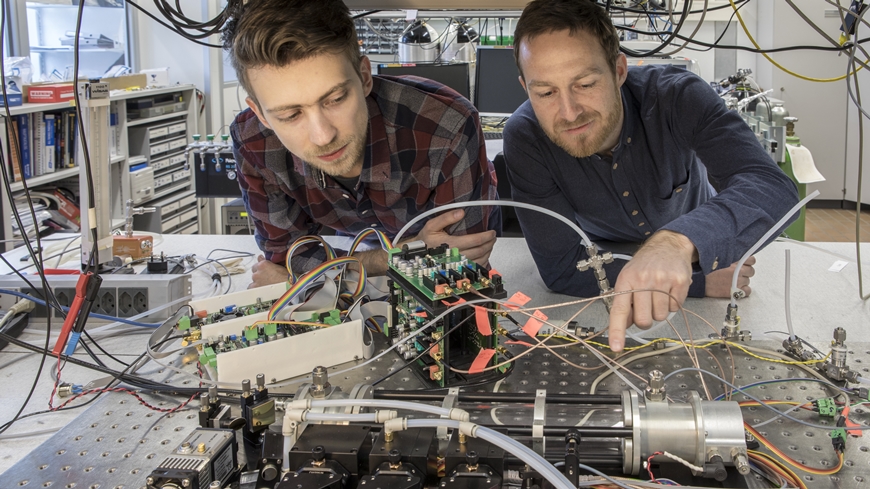Technology transfer with business incubators
Start-up companies take off here
For years, start-ups have been able to count on the support of the business incubators glatec and Startfeld. They accompany Empa's young companies on their path to independence – and do so extremely successfully, as the 37 spin-offs founded to date show.

Instruments for measuring air pollutants are usually complex, expensive and consume a lot of energy, as each gas is measured using a different method. The multi-gas analyzers from MIRO Analytical are completely different: They analyze up to ten greenhouse gases and pollutants quickly and precisely at the same time with just one device. When the Empa spin-off from Wallisellen was founded, the aim was to make air quality and greenhouse gas measurements simpler, more accurate and cheaper – and it succeeded big time: Since last fall, MIRO Analytical has been majority-owned by the Bruker Corporation, a group of companies in the field of instrumental analysis headquartered in Massachusetts. After IRsweep and CTSystems, another Empa spin-off has thus been taken over by a market leader.
Start-up support for young companies
“A successful exit, i.e. the sale of a start-up, is rather rare for high-tech niche products, as they usually grow slowly and almost never change hands,” says Mario Jenni, Managing Director of glatec, a business incubator in Dübendorf successfully operating since 2009 for Empa, Eawag and now also for WSL in order to facilitate and promote start-ups in the fields of materials science, environmental science and technology. On average, around ten young companies are housed at glatec, which require a wide range of support – from premises and market clarification to coaching for discussions with potential investors.
Every year, around four new spin-offs are added – usually two from Empa, one from Eawag and another external one, for example from ETH Zurich. Start-up funding has received an additional boost through the Empa Entrepreneur Fellowship, which supports young researchers for a year in setting up a company. For example, Empa researcher Abdessalem Aribia and Moritz Futscher founded the Empa spin-off BTRY in 2023, which was immediately accepted by the Business Innovation Center Switzerland of the European Space Agency ESA. Their thin-film batteries are safer, more durable and more environmentally friendly to manufacture than conventional lithium-ion batteries.
The making of neo-entrepreneurs
The counterpart to glatec in Dübendorf is Startfeld in St. Gallen. Startfeld was founded in 2010 by Empa together with the University of St. Gallen, the University of Applied Sciences East and the City of St. Gallen and took over the activities of Empa's former business incubator TEBO. Startfeld was recently awarded the prestigious Financial Times Award for the first time, making it one of Europe's leading Start-up Hubs in 2024. Another success story that is also reflected in the cross-location figures: The 37 Empa spin-offs founded so far, together with the other start-ups in the two business incubators, employ a total of more than 1100 people – which roughly corresponds to a doubling of the number of jobs, relative to Empa.
So what does it take to be successful as a start-up? According to Peter Frischknecht, Head of Startfeld since 2011, the questions are significantly different in science than in business – so neo-entrepreneurs need a certain amount of rethinking. “Startfeld therefore helps to transform researchers into company founders.” He supported and developed Empa's start-up support in St. Gallen for years as part of the technology transfer team until it was integrated into the then new Switzerland Innovation Park East in 2022. In future, start-ups will receive even more targeted support at the beginning of their growth phase. “There are many good ideas and patents in Switzerland, but there is also a noticeable reluctance to scale up. Unfortunately, this means that some of the potential can only be partially exploited,” says Frischknecht, explaining the challenge. The HSG START Accelerator is currently being set up in cooperation with the University of St. Gallen and the student initiative START Global.
Flexibility is key – and a strong team
“Young entrepreneurs know their technology down to the last detail, but they often lack a view of the market,” adds Mario Jenni. However, an invention will only be successful if it solves or at least alleviates a real problem. Entrepreneurial flexibility is crucial here: If things get stuck, there should be a willingness to adapt the business model, the technological focus or the team. “However, it is often difficult for company founders to detach themselves from their original idea and perhaps focus on a scientifically less interesting but marketable by-product.” Ultimately, the team also plays a decisive role: Promising technologies often fail on the market due to a lack of flexibility and market orientation. On the other hand, strong teams can succeed even with less convincing products.
Mario Jenni
CEO glatec
Phone +41 58 765 40 25
mario.jenni@empa.ch
Peter Frischknecht
Manging Director STARTFELD
Startfeld - Switzerland Innovation Park Ost AG
peter.frischknecht@startfeld.ch
Technology transfer
How do innovations get out of the lab and into the wider world? There are different ways, summarized under the term technology transfer. At Empa, technology transfer takes many different forms – be it through direct industry cooperation, Innosuisse-funded projects or by founding start-ups. If these endeavours are ultimately successful, they result in innovative products and solutions that make our world a little bit better.
Read the latest EmpaQuarterly online or download the PDF version.
-
Share
|
Best of Empa spin-offs If no industrial partner can be found for a promising new technology, researchers frequently become entrepreneurs themselves. Spin-offs are young companies that emerge directly from Empa's research. They develop products and services that do not yet exist – as these four examples show. |






